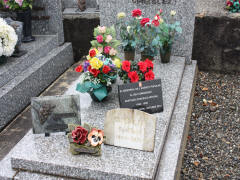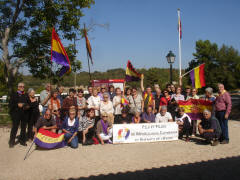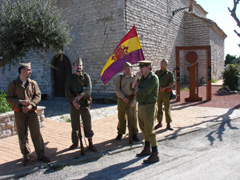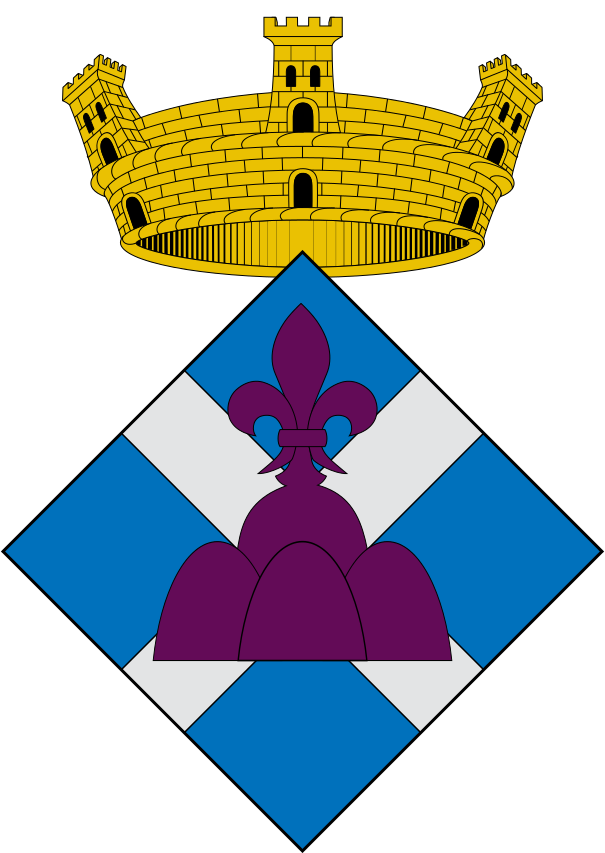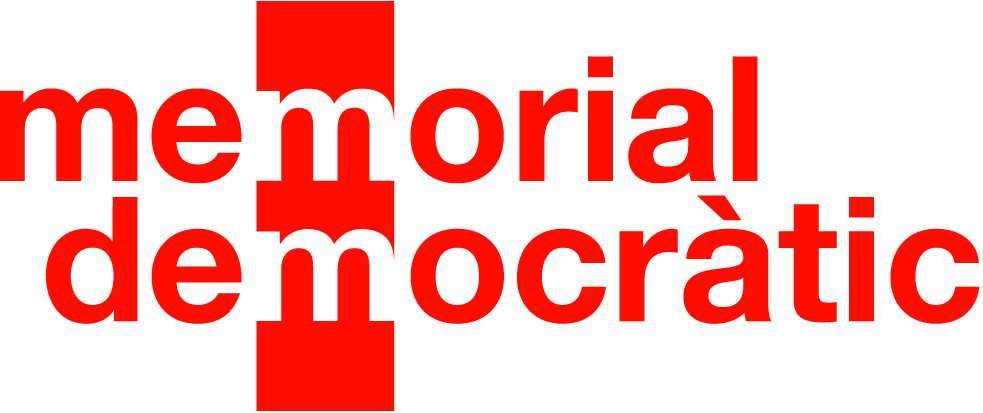As of 2019 the memorial will only open with prior reservation. Sorry for the inconvenience.
Our medal
Medal with a safety pin, of the Republic Generalitat, with the message “Let’s get ready”
This medal was delivered by the Generalitat to soldiers when they enlisted the army
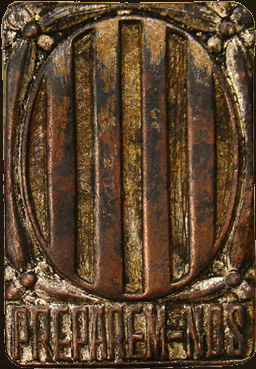
Presentation
During our childhood in Pujalt we played among the remains of shelters, holes, small mounds of stone… without knowing too much what they represented. When we asked the elderly about this, they replied: “this is from the War, it is better not to talk about it”.
The Spanish Civil War, lasting from 1936 to 1939, was like all wars: a collective tragedy that touched people’s life, hopes and future projects and made them suffer. Therefore, people who born years later, found a dictatorial Spain and lived a Catalonia deprived of its culture and historical rights.
What a few years ago was a dream, an ambitious project for Pujalt, is now a reality.
Those war structures, mountains of stones, shelters in the mountains, … where we played as children and which for someone were simply distant memories of childhood, have been recovered and have become a testimony of the experiences of a generation. These remains are also a tribute to all people that suffered directly from the tragic events that happened between 1936 and 1939.
We invite you to visit the museum facilities of our simulation of the training camp of the XVIII Popular’s Army of Pujalt’s Republic. Walking through the forest you will be immersed in a magnificent landscape and undoubtedly discover a world full of sensations and intense emotions, longing for the family, letters to parents, brothers or the fiancee, unique and little contact many times with the previous life of so many young people. The fear of the unknown, the war, the myth of fighting for ideas, freedom, the Republic, etc so many feelings, so many emotions, etc.
Visiting the camp facilities you will relive a silent world, which was disappeared for many years and that among all we have to keep as the living memory of everything that happened and we do not want to relive ever again.
In this web we propose you to make a virtual walk through these places, to have a first contact with history, spaces, houses, facilities, utensils, letters, memories and the feelings of those who suffered in their skin that unfortunate Civil war. Discover it!
In homage to all men and all women, boys and girls who lived and suffered those tragic moments of our history
Antoni de Solà
Presentation
Historical introduction
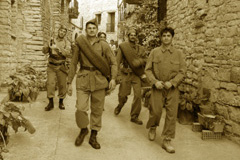
Soldiers
Spring of 1938. Spanish Civil War, 1936-1939, reaches its final year. Franco has sunk the front of Aragon, arriving at the Mediterranean Sea through Vinaroz and Alcanar, causing the division of the republican territory in two. The Second Republic government, with the firm and desperate purpose of defending Catalan territory, promotes a big and deep reorganization of the military units that were present in Catalonia.
From April 1938 onwards a new front follow the rivers Ebro, Segre and Noguera Pallaresa from the sea to France’s bordier, with some national bridge heads on the left side of the rivers: Tremp and Balaguer. Demoralization was very present at all levels of the Catalan rearguard.
During the spring of 1938, contingents of the XVIII Popular Army arrived in Pujalt in order to create what would be the INSTRUCTION BASE of this army.
Pujalt inhabitants having electric power, telephone, buildings to be used immediately, etc. supported logistics and organization of the Instruction Base that was been planned as a new military facility. The choice of this emplacement was also due to the proximity of water and a good transport communication, like the road from Cervera to Calaf. Pujalt was halfway between the front (60 km) and the large cities of the Catalan rearguard.
Main facilities (barracks, latrines, underground anti-aircraft shelters, tents, cabinets, kitchens, air defenses, theater, etc) were found in the “Bosc dels Obacs” in “La Muntada” area. The base also had a large and equipped sports area, with a soccer field, athletics track and showers; The laundry were located in the sector of “Tusquella” with a channel of 50 meters; And 2 km. To the southeast, we can found what it was like the firing range that still keeps the white trenches.
It is not known exactly how many soldiers used these facilities; approximately from 8,000 to 10,000 and with a capacity for about 1,200 soldiers.
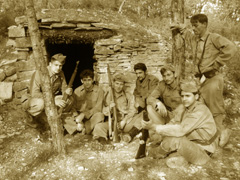
Soldiers at home
Interpretation center
A new step has been taken in the adaptation and museography of the Base of Instruction of the XVIII Corps of the Pujalt’s Popular Army. From October 10 of 2010 the Interpretation center of the Base of Instruction of the XVIII Corps of the Popular Army is already a reality. It is considered as the best civil war instruction conserved and better condicionted for visitors in Spain.
This project, financed by the Pujalt City Council, the Democratic Memorial, the Generalitat of Catalonia and the Ministry of Interior of Spain gives historical coverage and graphic support to a space already recovered and visitable, such as this camp, but now has a new enriching element.
What will you find in the Interpretation Center of the Base of Instruction of the XVIII Corps of the Popular Army?
The permanent exhibition welcomes visitors and brings the context necessary to understand all that surrounds and meant the Base of Instruction of the XVIII Corps of the Popular Army of Pujalt.
The exhibition is structured in the following sections:
Chronology
A complete chronology puts Pujalt, Catalonia and Spain in the fundamental historical moments in the evolution of the Spanish Civil War.
The why
This exhibition explains the situation in which the Republican Army is taking the decision to build a base of instruction and the reasons to choose Pujalt as a emplacement. Photographs of the spaces of the town that were used like military installations to the service of the Republic complete this section of the exhibition.
Life in the camp
Archaeological campaigns and ex-combatants and neighbors testimonies allowed us to know how life was like in the camp between 1938 and 1939. Inside camp’s life the exhibition goes into military instruction, clothing, hygiene, food and health and the relationship and contact with the family. Images and quantity of material found in the archaeological campaigns and material donated by relatives to Memorial, are exposed in this interpretation center.
Commander
Important and recent findings have clarified who was the commander of the Base of Instruction of the XVIII Corps of Pujalt’s Popular Army. His son, in Jacques, has given invaluable documentation that certifies his father’s command in this base and information that until that moment was unknown. The trajectory of the Commander, Santiago González Artigas, is the trajectory of a man committed and dedicated to the defense of his values. Throught the exhibition you will be able to know the family life of this man and his military service across the colonies of Africa, the Spanish Civil War and the French resistance to the Nazi occupation.
Joan Olivé Porter
Among the new findings there is certainly one especially emotive. Jacques Gonzalez, son of the commander of the base, preserved and donated a notebook of poems from his father, who preserved it during the end of the war, the exile and his stay in France. These poems were written by Joan Olivé Porté, personal secretary of the Commander, inspired by the “Stamps of Castelao”; some critics of Franco’s regime. The exhibition collects all these poems.
Castelao
The Galician artist of the prints in which the poems were inspired also has a space in this exhibition. Each of the prints are reproduced in the exhibition to understand the meaning and magnitude of Joan Olivé’s work.
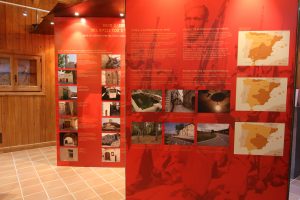
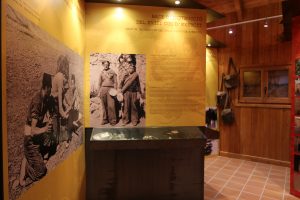
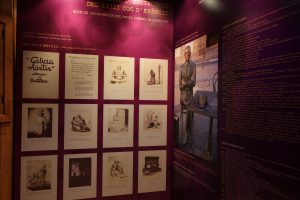
Chronology
The sequence of events ordered chronologically
Spain
Catalonia
Catalonia
Spain
Catalonia
Pujalt
Spain
Catalonia
Catalonia
Spain
Catalonia
Pujalt
Spain
Catalonia
Catalonia
Pujalt
Spain
Catalonia
Pujalt
Spain
Catalonia
Pujalt
Spain
Spain
Catalonia
Pujalt
Catalonia
Pujalt
Spain
Catalonia
Pujalt
Spain
Spain
Catalonia
Pujalt
Spain
Catalonia
Pujalt
Catalonia
Pujalt
Catalonia
Pujalt
Catalonia
Spain
Catalonia
Spain
Photo gallery
www.exercitpopular.org provides a photo gallery of the Memorial where the best images that have ever been captured during the visits will be collected and displayed.
For this reason, you can send them to us through our email: memorialexercitpopular@gmail.com indicating the author’s name, the photograph title and a small sentence of explanation. The photographs will be included, as soon as they arrive, to the photo gallery.
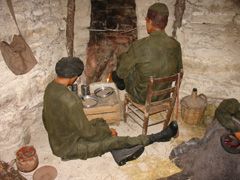
Dining near the fire
Title: Next to the fire
Author: Toni Pont
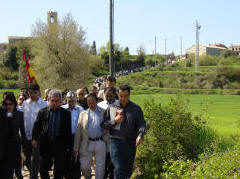
By the old road, to the Memorial
Title: Let’s go down
Author: Toni Pont
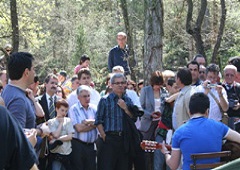
Big assistance in the Sebas’ concert
Title: Listening to republican songs
Author: Miquel Parramon
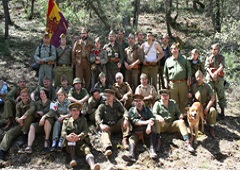
Different levels of the popular army
Title: A whole army
Author: Miquel Parramon
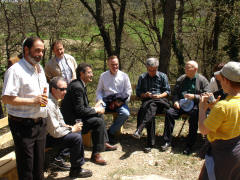
After the tour, feel like sitting down for a while
Title: After the visit
Author: Toni Pont
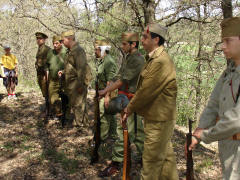
On the inauguration day, we found them everywhere
Title: Do they stand guard?
Author: Toni Pont
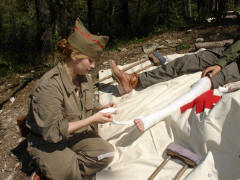
The Red Cross girls were also on the opening day
Title: Wounds
Author: Toni Pont
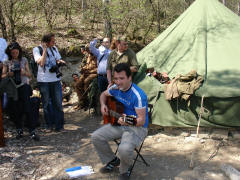
Sebas, singer-songwriter, delighted us with some trench song
Title: Sebas
Author: Toni Pont
Visit our full photo gallery
News
Be aware of all our news
THE MEMORIAL OF THE POPULAR ARMY GIVES HOMAGE TO THE COMMANDER SANTIAGO GONZÁLEZ ARTIGAS
Last Sunday, October 21, a representative of the MEMORIAL OF THE POPULAR PUJALT ARMY, visited the tomb of the commander Santiago González Artigas in the French town of Idron, next to the city of Pau. During the visit a plaque of honor and (…)
VISIT OF THE ASSOCIATION OF CHILDREN OF SPANISH REPUBLICANS AND CHILDREN OF EXODUS (FFREE) OF ARGELES SUR-MER IN THE MEMORIAL OF PUJALT POPULAR ARMY
Last Friday, October 5, 2012 a significant representation of more than 40 people from the FFREEE association of the northern Catalan population of Argelès Salen Mer visited the facilities of the Memorial of Pujalt’s Popular Army. The tour goes throught all (…)
Contact
Looking forward to your comments
